tijd
in
puppet_djt
Коллюзия
Художественный фильм "Spinning Boris" несколько преувеличивает роль американских советников в избирательной кампании Ельцина на перевыборах 1996. Американских политтехнологов, которые до этого работали в кампании республиканского губернатора Калифорнии Пита Уилсона, нанял Олег Сосковец, первый руководитель штаба Ельцина. Получив неограниченный бюджет на опросы и фокус-группы, американцы скрывались от посторонних глаз в «Президент-отеле» в номере по соседству с дочерью президента и передавали ей свои рекомендации.

On Feb. 14, Lowell called Joe Shumate, a G.O.P. expert in political data analysis who had served as deputy chief of staff to California Governor Pete Wilson. Since Wilson's drive for the 1996 Republican presidential nomination had ended almost before it began, Lowell thought Shumate and George Gorton, Wilson's longtime top strategist, might be available to help Yeltsin. They were--and they immediately enlisted Richard Dresner, a New York-based consultant who had worked with them on many of Wilson's campaigns.
Dresner had another connection that would prove useful later on. In the late 1970s and early '80s, he had joined with Dick Morris to help Bill Clinton get elected Governor of Arkansas. As Clinton's current political guru, Morris became the middleman on those few occasions when the Americans sought the Administration's help in Yeltsin's re-election drive. So while Clinton was uninvolved with Yeltsin's recruitment of the American advisers, the Administration knew of their existence--and although Dresner denies dealing with Morris, three other sources have told Time that on at least two occasions the team's contacts with Morris were "helpful." <...>
To preserve security, a contract was drawn between the International Industrial Bancorp Inc. of San Francisco (a company Braynin managed for its Moscow parent) and Dresner-Wickers (Dresner's consulting firm in Bedford Hills, New York). The Americans would work for four months, beginning March 1. They would be paid $250,000 plus all expenses and have an unlimited budget for polling, focus groups and other research. <...>
When Dyachenko moved her own office to the hotel to be near the Americans, the rest of the campaign took three floors of offices there as well. Yeltsin's badly split Russian advisers quickly set up separate fiefdoms on the eighth, ninth and 10th floors. Dyachenko worked almost exclusively on the 11th in Room 1119, directly across the hall from the Americans in 1120. She and they shared two secretaries, a translator, and fax, copying and computer-printing machines.
By the end, the team's office resembled a typical American campaign headquarters. Soda bottles and old food shared space with computer printouts. Graphs charting Yeltsin's progress in the polls hung on the walls, and the entire scene was dominated by a color-coded map of Russia with Post-it notes describing the vote expected in the nation's various regions. A safe stood unused, and documents intended for a shredder remained intact, in plain view.
Gorton followed Dresner to Moscow and encountered in Dyachenko a shy, intelligent and idealistic young woman who for some time recoiled at even the most mild American-style dirty trick. "But it wouldn't be fair," Gorton recalls her saying when he advised that Zyuganov be trailed by heckling "truth squads" designed to goad him into losing his temper. At their first meeting across a long table covered in green felt, Dyachenko confided, "I don't know this business. I don't know what to ask." For a few weeks, says Gorton, "the task was simple education, Campaigning 101, stuff like the proper uses of polling and the need to test via focus groups just about everything the campaign was doing, or thinking of doing."
http://content.time.com/time/magazine/article/0,9171,136204,00.html
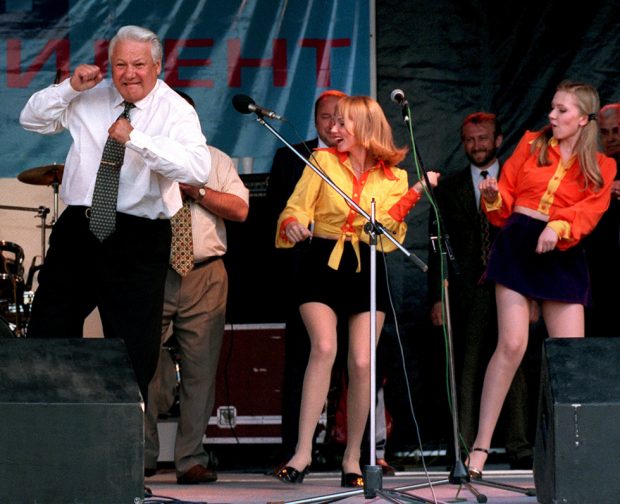
Нет, однако, прямых свидетельств того, чтобы американские рекомендации были востребованы после того, как группа олигархов договорилась поддержать Ельцина и поставала Анатолия Чубайса руководить его штабом. К примеру, такой прием, как использование третьего кандидата (Александра Лебедя), был достаточно очевидным, чтобы люди Чубайса не могли додуматься до него самостоятельно.
In fact, all of the Americans' memos seemed to chase events, not make them. Their March memo urging Yeltsin to bash government officials responsible for not paying back wages was written two months after the bashing campaign began. Their May 5 memo urging Yeltsin to woo Gen. Alexander Lebed came weeks after the deal with Lebed was struck. Their memo after the first round urging an early election date came days after the issue was decided by the campaign managers.
https://www.washingtonexaminer.com/weekly-standard/yanks-brag-press-bites-8538
They seem to have had no contact with any of the other top campaign strategists, including Anatoly B. Chubais, a former Deputy Prime Minister who coordinated fund-raising and strategy, or Igor B. Malashenko, the chief executive of NTV, a privately owned network, who worked as Mr. Yeltsin's top media adviser.
"All I can say," said Aleksandr A. Oslon, who was in charge of polling and research and said he never met the consultants, "is that when all the real decisions were made, they were not present."
https://www.nytimes.com/1996/07/09/world/moscow-journal-the-americans-who-saved-yeltsin-or-did-they.html

Березовский о Чубайсе:
- Что вы имеете в виду, когда говорите "недалекий человек"?
- Это определяется тем, насколько адекватен человек в оценке самого себя. Чубайс хорошо исполняет задания, которые дает ему хозяин. В свое время он был нанят на работу теми, кого потом стали называть "семибанкирщиной". Это факт. Он был наемным служащим с очень хорошей зарплатой. И он адекватно этой зарплате справился с задачами, которые перед ним поставили эти конкретные люди. А задача была простая - нам нужно было выиграть президентские выборы. Простая по постановке и сложная в реализации.
- И как же недалекий, как вы говорите, человек мог бы с ней справиться?
- Ни одной идеи во время этой кампании не исходило от Чубайса. Он не генератор идей, но блестящий их аналитик и реализатор. Очень часто наши предложения вызывали у него возражения, но потом он смирялся или подхватывал их. Во всяком случае, он их исполнял, и на очень высоком уровне.
- Какие идеи он не принимал, например?
- Он был сначала шокирован идеей привлечения Лебедя и союза Ельцин--Лебедь. Он так до конца и не принял участия Невзорова в предвыборной кампании, отрицал полезность, называл его фашистом.
- В этом, думаю, Чубайс был не одинок. Но в целом он оправдал надежды, которые вы на него возлагали?
- Да, он выполнил задачу, которая была перед ним поставлена. Как наемный работник за очень хорошую зарплату. Заметьте, я нисколько не сомневаюсь, что им двигали не только меркантильные соображения. Все, кто принимал участие в предвыборной кампании, были связаны еще и идейно. Было бы вульгарно утверждать, что Чубайс работал только за деньги, но, как оказалось в дальнейшем, деньги играли тоже существенную роль.
https://www.kommersant.ru/doc/194402
Ходорковский о Чубайсе:
Никакой политической власти у нас не было. Единственное, что мы могли сделать,- это убедить Ельцина. А кто мог убедить Ельцина? Мы прикинули, что сделать это может Чубайс. Умеет он как-то убеждать Бориса Николаевича. Мы пришли к Чубайсу. "Анатолий Борисович, вот, такая история". Он говорит: "Это вам надо, мне это не надо, у меня все хорошо. Вам надо - платите". Мы: "Окей. Сколько?" Он сказал, сколько. Я не помню сейчас уже. Я помню, но сейчас забыл. То ли два, то ли три миллиона долларов.
https://www.kommersant.ru/doc/4627537
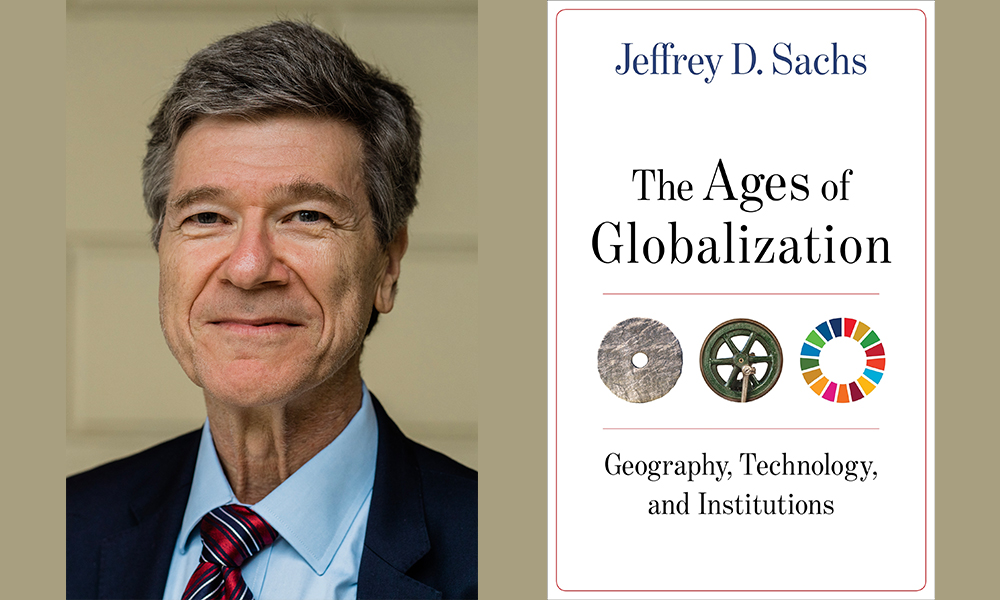
Если влияние американских политических советников было умеренным, то влияние экономических советников было достаточно прямым.
В 1991 экономическая звезда, 37-летний профессор из Гарварда Джефри Сакс приезжает в СССР на встречу с 35-летним Гайдаром и 36-летним Чубайсом. Втроем им предстояло осуществить один из крупнейших экономических экспериментов в истории. Сакс проведет около недели в напряженной работе на 15-й даче в подмосковном Архангельском, где команда Гайдара секретно готовит пакет реформ для Ельцина по переходу от плановой советской экономики к рыночной.
В декабре 1991 Сакс участвует в успешной встрече гайдаровцев с Ельциным и начинает работу советником российского правительства, которая продлится по декабрь 1993, без отрыва от его работы профессором в Гарварде. К началу этой деятельности он уже зарекомендовал себя "шоковой терапией" в Боливии и Польше. Его вклад в историю этих стран можно в полной мере оценить сейчас, когда политические качели, запущенные шоковыми реформами, толкнули Польшу в сторону фашизма и продолжают трясти Боливию.
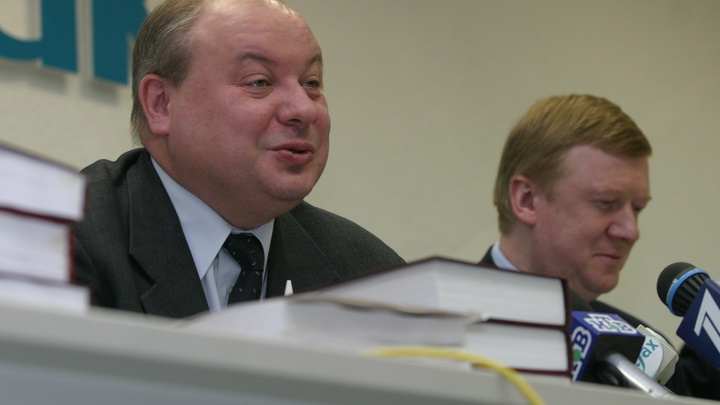
Репортаж под названием "Russia's Controversial Course" из Москвы в январе 1992, времени отпуска цен:
Ten days after initiating one of the most ambitious economic experiments of all time, Russian President Boris Yeltsin is like a passenger on a locked bus hurtling down a mountainside without brakes. That is the view of prominent economist Grigory Yavlinsky.
The best the West can do, he says, is get out of the way.
Wrong, insists another prominent reform economist, Jeffrey Sachs of Harvard University, who is advising the Russian government on its economic transition. Yeltsin is a gutsy and astute pilot, steering Russia in the right direction after 74 years of wrong-headed communist economics. The West must help now, while there is still a chance of success. <...>
Sachs, who advised the Polish government on its economic conversion plan, said the West should be grateful that, after 74 years of communism, Russia emerged with a government that is "Western-oriented, peaceful, non-nationalistic, democratic and committed to the free market."
"I think it's a miracle," he said. "And I think that a very positive outcome is a real possibility -- not a dream, but a real, concrete, practical possibility."
https://www.washingtonpost.com/archive/politics/1992/01/12/russias-controversial-course/26edc504-4e50-459c-8d4c-148d5d5caa3b/
Репортаж под названием "Dr. Jeffrey Sachs, Shock Therapist" из Москвы в июне 1993, времени галопирующей инфляции и противостояния Ельцина и Госдумы:
Sachs talks frequently with Fyodorov and the other dynamo of the economic reform drive, Anatoly Chubais, the chairman of the privatization agency. He has a good working relationship with other senior reformers, including Aleksandr Shokhin, a Deputy Prime Minister, and Sergei Glaziyev, the Minister for Foreign Economic Relations. But he is not an employee of the Russian Federation. "I make it a policy not to take money from the Governments that I advise," he says. "It's better for me and better for them."
Sachs does, however, need cash to cover his own travel expenses and to support a sizable staff. Over the last three years most of the money came from the United Nations World Institute for Development Economics Research in Helsinki. Now a good chunk consists of grants from the Swedish Government, the United States Agency for International Development and the Ford Foundation.
The task before Sachs and his Western economists this day is to identify the most expendable items in the budget. A primary target is energy, which Russia still produces (and wastes) in abundance. How much money would a cut in consumer subsidies on natural gas save? How much would it reduce the consumption of gas -- and could the resulting surplus be sold to Europe for hard currency? Since nobody present is an energy specialist, one economist is dispatched to research the experience in the former Eastern European satellites, which were left on their own to buy oil and gas when Mikhail Gorbachev cut them free.
It will be a long day -- indeed, days -- for the group to come up with a series of suggested budget savings that might withstand scrutiny from a skeptical presidential cabinet and a hostile Parliament. But nobody is complaining: Sachs, in spite of chronic jet lag, works harder than anyone. In fact, during most semesters, he actually carries a full teaching load at Harvard, squeezing his trips abroad between classes and during breaks in the academic calendar.
Besides, Sachs is offering these mostly young economists a role in the redemption of Russia -- a heady experience for academics who might otherwise be holed up in some dusty office calculating how many parameters could dance on the head of a computable general equilibrium model.
https://www.nytimes.com/1993/06/27/magazine/dr-jeffrey-sachs-shock-therapist.html
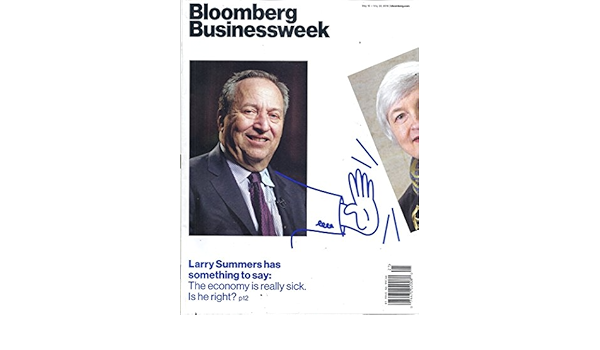
Сакс пристроил коллег из Гарварда работать в Москве через HIID (Harvard Institute for International Development) - организации, которая получает эксклюзивный внеконкурсный грант от USAID (United States Agency for International Development) для помощи реформам в России. В 1994-1999 он работает директором HIID.
Получению гранта помогает не только репутация Гарвада, но и связи в верхах - бывший коллега по экономическому факультету Гарварда Ларри Саммерс во время распада СССР работал главным экономистом Мирового Банка. Саммерс одного возраста с Саксом (на 25 дней младше) и такой же еврейский вундеркинд. Оба стали одними из самых молодых профессоров в Гарварде, получив "tenure" в 28 лет. В администрации Клинтона Саммерс занимает пост заместителя министра финансов по международным делам, с 1995 - первого заместителя министра, с 1999 - министра. Он покровительствует программе "шоковой терапии" и стремительной приватизации, которой занимаются в Москве его бывшие коллеги.
After Summers entered Treasury in 1993, he fought with State and Defense Department officials for control of Russia policy. His secret weapon was the International Monetary Fund, whose assistance Russia urgently needed, as its economy was collapsing. Abrupt price decontrol, executed on January 1, 1992, had led to annual inflation rates of over 2,000 percent. Would the IMF be generous or stingy, and what conditions would be attached? As undersecretary, Summers was the main U.S. liaison with the IMF, and not shy about using that leverage.
The Clinton administration was divided. People who knew the region best argued that Russia should be given time and large financial help to convert to a European-style, democratic mixed economy. They were opposed by military hawks who viewed post-Soviet Russia as a continuing geopolitical threat, and by free-market hawks led by Summers, who counseled shock therapy.
https://prospect.org/economy/falling-upward-larry-summers/

В ретроспективе Сакс достаточно реалистично описывал проблему российской коррупции, которая встала на пути реформ и признавал, что у российского общества не было сдержек и противовесов против коррупции. При этом было, что воровать - в богатой на ресурсы стране лакомые куски прежней государственной собственности доставались олигархам за бесценок, порождая мнгновенных миллиардеров.
JEFFREY SACHS: Russia experienced a level of corruption really rare in the world. A lot of societies have corruption. But Russia had three things that were a quite rare combination. First, it had no civil society, [no] organized opposition to government that could tame government, that could discipline government, that could keep it honest. So you had elites that were free to act without the restraining hand of judiciary or the Bar Association or religious groups or other organized groups.
The second thing you had was an elite that had grown up in such an amoral, and I think one should say immoral, environment under the Soviet system.... Okay, now we're in a private property system, we'll steal it. And it was a more ruthless kind of corruption than I'd seen in most places. Other places, they'd probably also had it, but Russia was at the pretty far end of the process.
The third thing that Russia had was a lot to steal. And this is the rare combination, because there are a lot of corrupt places that don't have that much to steal, but Russia had this extraordinary combination of huge natural resource reserves, and they were in state hands. So you had all of these elements. You had the oil, the gas, the nickel, the chromium, the diamonds, the gold. They were in state hands for the taking, as it were. There weren't the restraining influences of civil society and there wasn't the ethic within government itself that you don't touch that stuff.
So what happened was that in 1994, and even more in 1995 and '96, some of the most valuable natural resource deposits which had been put into these corporate forms were simply given away, in essence, to those people we now call the oligarchs who became billionaires overnight. It's not so easy to become a billionaire overnight, except maybe floating a dot com, which they weren't doing. They had a different way to become a billionaire overnight, and that was to be on the inside circle of the Kremlin and be able to grab one of these resource companies.
https://www.pbs.org/wgbh/commandingheights/shared/minitext/int_jeffreysachs.html
В свое оправдание Сакс говорил, что занимался финансовой политикой и дистанцировался от программы приватизации.
"During the entire period of my advising, I had only a tangential role in the plans for privatization of major industries. In late 1991, I briefed Anatoly Chubais, the incoming head of the State Property Commission, about alternative strategies for privatization. I believed that small shops should be privatized through auctions, with a bias towards the internal workforce. For small and medium enterprises, of which there were tens of thousands, I supported a mixed approach, including quick sales or leases to workers. For the natural resource sectors, I saw no urgency at all in privatization. For the oil and gas sector, the core of the Russian hard currency earnings, it was critical in fact for the Russian Government (and Russian society) to continue to reap the income stream from these resources. <...> However, during the actual process of privatization I played no role."
http://www.acamedia.info/politics/ukraine/jeffrey_sachs/What_I_did_in_Russia.pdf
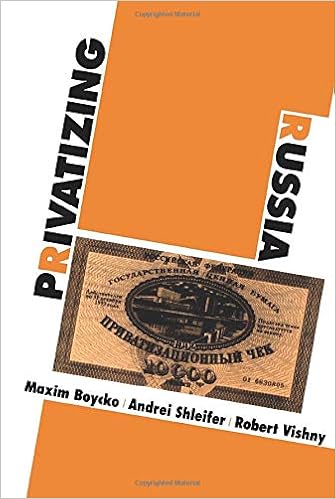
Приватизацией занимался его коллега Андрей Шлейфер.
Шлейфер - тоже вундеркинд, но с несколько иной биографией. Он родился в Москве и приехал с родителями в США в 15-летнем возрасте, осваивая английский по телесериалам. Сменив специальность с математики на экономику, в 30-летним возрасте Шлейфер стал одновременно профессором на одном факультете с Джеффри Саксом и свидетелем распада СССР. Он считался протеже Ларри Саммерса и возглавил московский отдел HIID, работая в тесном контакте с Чубайсом.
Работа закончилась скандалом. Шлейфер, грубо говоря, проворовался. Как выяснилось, участвуя в приватизации российских предприятий в качестве советника, представляющего американское правительство через грант USAID, он одновременно тайно вкладывал собственные деньги в акции перспективных предприятий.
Andrei Shleifer, a Russian-born Harvard professor of economics and the Russia project director of the Harvard Institute for International Development (HIID), advised Chubais from 1992 to 1997. It was at HIID that the idea of voucher privatization was first introduced (Aslund 2007b), and Shleifer went on to work closely with Chubais in the loans-for-shares privatization program that permanently transformed property relations in the country. HIID administered early funds from the US government: $57.7 million awarded by USAID and $350 million that President George H. W. Bush earmarked for America’s “Freedom of Russia and the Emerging Eurasian Democracies and Open Market Support Act” (McClintick 2005; Wedel 2001). Shleifer, among others, was instrumental in promoting the view that the government needed to be pushed out of the economy as quickly and as comprehensively as possible. As one of Anatoly Chubais’ primary advisers, he helped to write a publication called Privatizing Russia in 1995, which states:
At least in Russia, political influence over economic life was the fundamental cause of economic inefficiency, and that the principal objective of reform was, therefore, to depoliticize economic life. Price liberalization fosters depoliticization because it deprives politicians of the opportunity to allocate goods. Privatization fosters depoliticization because it robs politicians of control over firms.
Shleifer also helped tarnish the legacy of Western-led reforms by secretly investing in Russian securities while leading the project, in violation of HIID and US government conflict-of-interest rules (Sachs 2012). When the US government found out, it sued Harvard University. In 2005, a settlement was reached with Harvard paying $26.5 million in fines and Shleifer paying $2 million (McClintick 2005).
https://geohistory.today/russia-shock-therapy/

Шлейферу повезло. К тому времени, когда министерство юстиции закончило расследование и предъявило судебный иск, Ларри Саммерс стал президентом Гарварда и встал на защиту своего подопечного. Гарвард согласился выплатить почти $30 миллионов штрафа и прикрыл HIID во избежание дальнейших скандалов, а Шлейфер сохранил свой пост и академическую репутацию. Он считается одним из самых цитируемых экономистов в мире, одна из его самых цитируемых статей (опубликованная в 1993 в The Quarterly Journal of Economics) называется по-простому "Corruption".
Предполагают, что именно этот скандал вынудил Саммерса в феврале 2006 уйти в отставку с поста гарвардского президента.
"How Harvard Lost Russia" was published in the January issue of Institutional Investor magazine, a subscription-only publication, about a month and a half before Dr. Summers's resignation, which he announced last Tuesday. The move came just two weeks after a Feb. 7 meeting when the president was challenged on several issues, including his reaction to events described in Mr. McClintick's article.
In roughly 18,500 words, (22,007 including sidebars), Mr. McClintick chronicled financial improprieties by those in charge of Harvard's Russia project, including Andrei Shleifer, a professor of economics who is a friend and protégé of Dr. Summers's, and Jonathan Hay, a Harvard-trained lawyer. The two men were accused of making personal investments in Russia at a time when they were working under contract to establish capitalism in the former Soviet nation.
Their behavior led the United States government to file civil charges against Harvard, Mr. Shleifer and Mr. Hay for fraud, breach of contract and making false claims.
https://www.nytimes.com/2006/02/27/business/media/did-an-expose-help-sink-harvards-president.html
Но без дела он не остался и вскоре всплыл в качестве главного экономического советника Обамы, а ныне, несмотря на протесты прогрессивных демократов, подвизается в роли одного из советников переходной команды Байдена.

Шлейфер с женой (Нэнси Циммерман) вкладывали деньги в приватизируемые российские компании частично в партнерстве с Леонидом Блаватником (ныне Сэром Леонардом Блаватником), партнером Виктора Вексельберга.
In July 1994, Shleifer and Nancy Zimmerman began investing in Russia in direct violation of his contract and the restrictions imposed by AID and Harvard.
Though she called her husband "Boss," Zimmerman, 31, was a hard-charging financial wizard in her own right. She had left a lucrative career at Goldman, Sachs & Co. in New York to start a hedge fund in Cambridge, Farallon Fixed Income Associates, in a joint venture with Farallon Capital Management, a prominent fund group based in San Francisco. Zimmerman earned far more trading bonds than Shleifer did teaching economics: $1.06 million to his $191,000 in 1994. Their combined income supported a comfortable lifestyle, including a spacious home in the affluent Boston suburb of Newton.
In 1994, Shleifer and Zimmerman, with the help and advice of Leonard Blavatnik, a New Yorkbased Russian emigrant and a member of the Forbes 400, placed $200,000 in a Blavatnik vehicle called Renova-Invest, which invested in a group of Russian corporations that were being privatized under Shleifer's guidance. The companies included telephone operator Rostelecom; oil and natural-gas behemoth Gazprom; aluminum smelters in the cities of Irkutsk, Sayansk and Bratsk; Vladimir Tractor; and oil producer Chernogorneft. The U.S. government alleged in its complaint against Harvard, Shleifer and Hay that these companies benefited financially not only from Shleifer's advice on privatization but also from AID-funded assistance, including free legal services. When Blavatnik was merging several aluminum companies in which Shleifer and Zimmerman had invested, Hay and other AID-funded lawyers worked on the merger documents at no cost to Blavatnik or the companies. According to a U.S. statement of "undisputed material facts" submitted with the lawsuit, Hay was aware of some of the private investments of Shleifer and his wife, which were violations of the bars against private investment in Russia.
Also in the summer and fall of 1994, the Shleifers partnered with Farallon Capital Management to invest in Russian oil stocks. "Investing in Russia at that stage was like the Wild West, and we were petrified about getting involved," Farallon partner David Cohen later told a federal grand jury. (Farallon would, in fact, lose money on these oil stock investments.)
Cohen, who had been a Rhodes Scholar at Oxford University with Hay, said: "There was incredible crookery. . . . We wanted to get as much protection as we could . . . and we thought Andrei provided some of those things. People might have been more hesitant to hurt Andrei Shleifer than to hurt Farallon. . . . His relationship to Chubais was definitely one of the factors."
Shleifer began the investment process on August 11, 1994, by wiring $165,000 to a Channel Islands bank account for the purchase of 30,000 shares of Russian oil company Purneftegas. By November 4 a total of more than $4 million was invested, 90 percent by Farallon, 10 percent by Shleifer and Zimmerman. The Shleifers concealed their investment by registering the shares in the name of Zimmerman's father, Howard Zimmerman, a Chicago investor in real estate and racehorses and a director and shareholder of a small institution called Central Illinois Bank.
https://www.institutionalinvestor.com/article/b150npp3q49x7w/how-harvard-lost-russia
В 2018 щедрый Блаватник пожертвовал $200 миллионов Гарвардской медицинской школе, где вскоре был основан институт его имени.
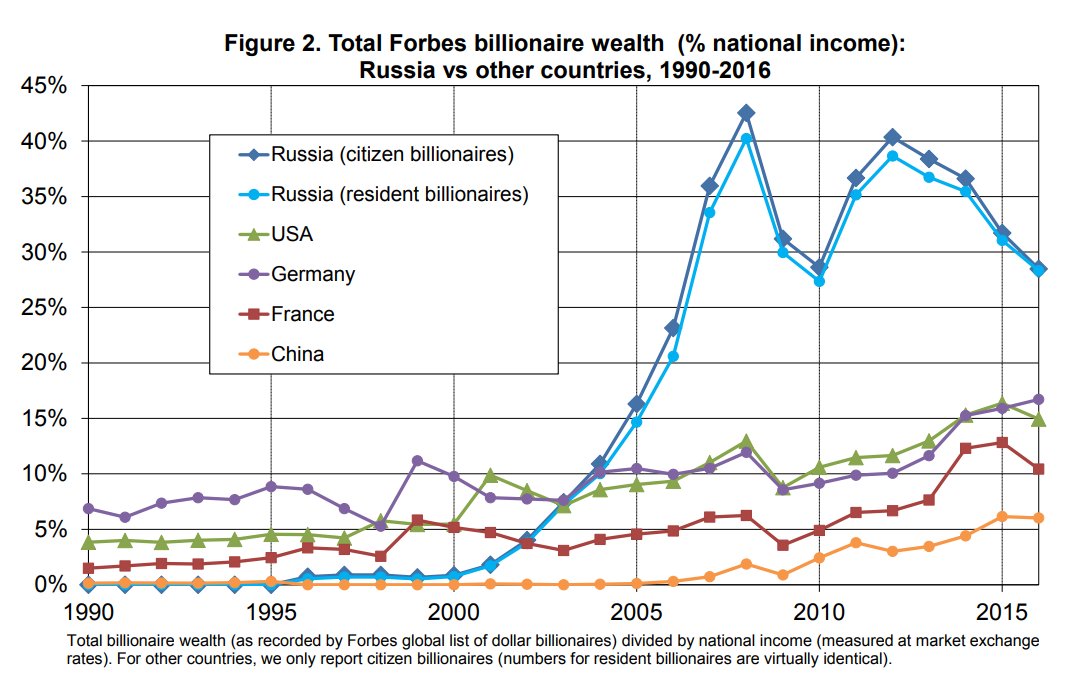
Последствия российской приватизации, которые сделали Блаватника одним из богатейших людей в мире, легче увидеть на расстоянии. Анализируя российское имущественное распределение в амбициозной статье "From Soviets to oligarchs: inequality and property in Russia 1905-2016", Том Пикетти с соавторами обнаружили парадокс. Год за годом экспортируя больше, чем импортируя (в основном природных ресурсов), пост-советская Россия должна была бы накапливать капитал. Но, за вычетом приватизированных квартир, на руках у россиян мало накоплений. Авторы объясняют этот парадокс тем, что значительная часть богатства концентрируется в руках узкой прослойки олигархов-миллиардеров и тихо выводится ими в офшоры за границу. На темных офшорных счетах хранится примерно столько же богатства, сколько находится в руках россиян внутри страны.
"In effect, it is as if the privatization of Russian companies did not lead to any significant long-run rise in the value of household financial assets, in spite of the fact that it is now possible to own financial shares in Russian firms, which seems especially paradoxical. <...> In our view, the main explanation for this paradox is the fact that a small subset of Russian households own very substantial offshore wealth, i.e., unrecorded financial assets in offshore centers. <...>
According to our benchmark estimates, offshore wealth is about three times larger than official net foreign reserves (about 75% of national income vs. around 25%), and is comparable in magnitude to total onshore household financial assets. That is, there is as much financial wealth held by rich Russians abroad-in the United Kingdom, Switzerland, Cyprus, and similar offshore centers-than held by the entire Russian population in Russia itself."
https://link.springer.com/article/10.1007/s10888-018-9383-0
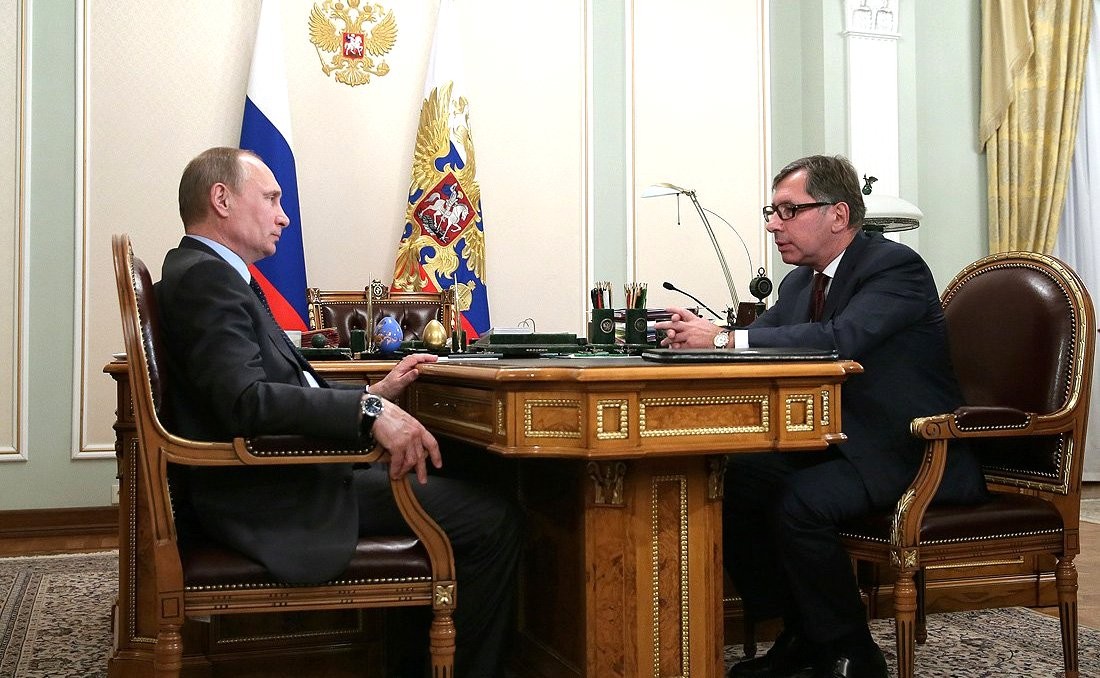
В нынешней устойчивой системе олигархи контролируют выкачивание национального богатства за границу, а Путин контролирует олигархов и имеет свою долю.
According to the most reliable estimates, Russia has the world’s largest volume of dark money hidden abroad-about $1 trillion-both in absolute terms and as a percentage of its national GDP. An estimated one-quarter of this amount is controlled by Russian President Vladimir Putin and his close associates, and the Kremlin appears to be able to persuade dependent oligarchs to assist financially in its foreign policy undertakings. These oligarchs hire the best lawyers, auditors, bankers, and lobbyists in the world to develop legal means to conceal and launder their funds. They thus often have greater resources than the regulators tasked with maintaining the integrity of national financial systems. And while governments generally operate in their own single country, a serious Russian oligarch lives (with eminent security) in half a dozen countries, has layers of anonymous shell companies in a score of offshore jurisdictions, and his funds move at lightning speed between them.
https://www.atlanticcouncil.org/in-depth-research-reports/report/defending-the-united-states-against-russian-dark-money/
В показаниях американским следователям миллиардер Петр Авен рассказал, что входит в группу около 50 российских олигархов, которые регулярно (раз в квартал) встречаются с Путиным и получают от него руководящие указания. Из отчета Мюллера:
Aven told the Office that he is one of approximately 50 wealthy Russian businessmen who regularly meet with Putin in the Kremlin; these 50 men are often referred to as “oligarchs.” Aven told the Office that he met on a quarterly basis with Putin, including in the fourth quarter of 2016, shortly after the U.S. presidential election. Aven said that he took these meetings seriously and understood that any suggestions or critiques that Putin made during these meetings were implicit directives, and that there would be consequences for Aven if he did not follow through. As was typical, the 2016 Q4 meeting with Putin was preceded by a preparatory meeting with Putin’s chief of staff, Anton Vaino.
Закончим небольшой исторической эксурсией в далекий 1998. Длинные выходные в конце мая (Memorial Day weekend) - хорошее время для выпуска на экраны голливудских блокбастеров. В 1998 главным блокбастером в это время был фильм "Годзилла" (коммерчески успешный, но не представляющий художественной ценности). Он соперничал с комедией Bulworth о гримасах политического популизма и фильмом-катастрофой "Deep Impact" про комету, падающую на Землю.
Для борьбы с кометой президент США (в исполнении Моргана Фримана) заручался поддержкой дружественной России. В героическом экипаже астронавтов, летящих к комете, находился русский космонавт в исполнении Александра Балуева, который через 20 лет станет доверенным лицом Путина на его перевыборах.

В эти длинные выходные произошли три события, между которыми на первых взгляд не было ничего общего.
1. 26 мая 1998 репортер Роберт Фридман публикует взрывной репортаж "Тhe Most Dangerous Mobster in the World" о Семене Могилевиче.
The enigmatic leader of the Red Mafia is a 52-year-old Ukrainian-born Jew named Semion Mogilevich. He is a shadowy figure known as the “Brainy Don” - he holds an economics degree from the University of Lvov - and until now, he has never been exposed by the media. But the Voice has obtained hundreds of pages of classified FBI and Israeli intelligence documents from August 1996, and these documents - as well as recent interviews with a key criminal associate and with dozens of law enforcement sources here and abroad - describe him as someone who has become a grave threat to the stability of Israel and Eastern Europe.
https://www.villagevoice.com/1998/05/26/the-most-dangerous-mobster-in-the-world/
Тогда же становится известно о расследовании компании YBM.
An official with the United States Customs Service, who spoke on condition that his name not be used, said YBM was being investigated on suspicion of money-laundering and having close ties to members of Russian organized crime. The company's primary manufacturing plant and most of its sales are in Eastern Europe and the former Soviet republics. <...>
F.B.I. officials would not comment on the nature of their investigation of YBM or on the connection of Mr. Mogilevich to the company. Nor would the agency confirm any suspicions about Mr. Mogilevich's activities, other than to say that "we are aware of him."
https://www.nytimes.com/1998/05/27/business/international-business-us-raid-takes-down-a-onetime-canadian-highflier.html
Позже афера с этой компанией станет одним из пунктов американского уголовного обвинения против Могилевича.
MOGILEVICH provided the funds and authorized the formation of the Network of YBM companies described herein. He exercised control over the companies through: (a) his ownership and control of YBM stock; (b) his relationship with defendants IGOR FISHERMAN and JACOB BOGATIN, who held key executive positions within YBM and the Network of YBM companies; and (c) his influence over persons, activities, and the bank accounts of the various companies comprising the Network of YBM companies.
https://online.wsj.com/public/resources/documents/ruslobby-mogilevich-04172007.pdf
Подобные финансовые аферы на сотни миллионов долларов с дополнительным отмыванием миллиардов долларов демонстрировали, почему по сравнению с "красной мафией" в ее сращивании с "Лубянской преступной группировкой" знаменитая итальянская "коза ностра" выглядела детским садом.

2. 26 мая 1998 президент Ельцин назначает малоизвестного Владимира Путина на ключевую должность первого заместителя главы администрации президента Валентина Юмашева. Появляется трамплин для последующего роста.
На место Митиной назначен руководитель государственного контрольного управления президента Владимир Путин. Он пришел в администрацию еще в "чубайсовском" призыве, но сумел сработаться с Валентином Юмашевым и в последнее время считается одной из самых влиятельных фигур в Кремле.
https://www.kommersant.ru/doc/198930
По словам Юмашева, Путина ему изначально рекомендовал Чубайс.
- Как вы нашли Путина?
- Путина нашел не я, Путина нашли Анатолий Чубайс и в тот момент начальник Главного контрольного управления администрации президента Алексей Кудрин. Это был момент, когда Чубайс и Кудрин уходили в правительство, а я становился главой администрации.
- Вы его потом продвигали. С чем это было связано?
- Через несколько месяцев мне стало понятно, что этот молодой человек является очень сильной фигурой. На наших совещаниях он абсолютно точно все формулировал, у него был прекрасный анализ и здравые идеи. А у меня в тот момент была очень сильная администрация президента: Сергей Ястржембский, Михаил Комиссар, Джохан Поллыева, Сергей Приходько.
Я же остановил свой выбор на Путине, потому что из всех этих моих коллег он показался мне самой сильной фигурой. И с этим предложением я пошел к Борису Николаевичу.
https://www.dw.com/ru/%D0%B2%D0%B0%D0%BB%D0%B5%D0%BD%D1%82%D0%B8%D0%BD-%D1%8E%D0%BC%D0%B0%D1%88%D0%B5%D0%B2-%D0%BF%D1%83%D1%82%D0%B8%D0%BD%D0%B0-%D0%BD%D0%B0%D1%88%D0%B5%D0%BB-%D0%BD%D0%B5-%D1%8F/a-51691790

3. 26 мая 1998 Чубайс прилетает в Вашингтон в качестве специального представителя Ельцина. Его миссия - уговорить Клинтона и его администрацию надавить на Международный Валютный Фонд для выделения России нового кредита в предверии финансового краха.
Ключевая встреча проходила в доме Ларри Саммерса, с поеданием бубликов в компании Алана Гринспенa. Незадолго до нее Саммерс лично ездил в Москву налаживать контакты на месте.
This week, in a complete reversal, the I.M.F. and the Russian Government announced a bailout package that will inject $17.1 billion in new loans to the beleaguered nation over the next 18 months.
The Clinton Administration was the driving force behind the reversal, impelled by the specter of Russia's financial collapse. United States Treasury officials were worried that while negotiations with the Russians dragged on over forcing real economic change, the political peril to the Government of President Boris N. Yeltsin was growing. They pressed the fund to double the amount of money it was willing to lend to Russia, even though it depleted the I.M.F.'s own resources for fighting the economic contagion that is spreading beyond Asia. <...>
In May, the week before the annual summit meeting of Western leaders, the two American officials who have focused on Russia's economic reform went to Moscow to take the temperature.
One was Lawrence H. Summers, the Deputy Treasury Secretary, a former Harvard economist who has come to personify the new face of American financial power around the world. The other was David Lipton, a Treasury Under Secretary for International Affairs, an intense 44-year-old who has cultivated a strong relationship with Russian economic strategists. <...>
Arriving just before the long Memorial Day weekend, the Chubais team headed straight for the Treasury Building next to the White House.
They came not for money but for reassuring words of praise and public commitment from President Clinton that if Russia needed more aid, the United States would lend its support.
The next morning, Mr. Chubais and his associates drove through the diplomatic enclave of northwest Washington to the home of Strobe Talbott, Deputy Secretary of State and a longtime Russia expert.
Mr. Talbott told them that President Clinton was willing to support additional financial help to Russia under the right conditions.
The Russians drove on to Mr. Summers' house in the Maryland suburbs. Mr. Lipton and other top Treasury officials were there, all wearing blue jeans and sport shirts. The Russians were in suits and ties, preparing to meet later with the ever-formal Alan Greenspan, chairman of the Federal Reserve.
Over bagels, muffins and orange juice, Mr. Chubais made his appeal: Washington had a historic opportunity to help Russia.
"It used to be that there were only a few reformers," Mr. Chubais said. "Then there were a good number of reformers. In this Government," he said, "They are all reformers."
As the conversation shifted to tactics, the group decided that the United States would send a signal that it stood behind Russia.
https://www.nytimes.com/1998/07/17/world/rescuing-russia-special-report-bailout-kremlin-us-pressed-imf.html

8 сентября 1998, уже после финансового краха и дефолта, Чубайс в интервью Евгении Альбац откровенно признается, что занимался враньем и с помощью американских друзей кинул МВФ.
- Ибо, повторю, perception is reality, восприятия, ожидания, страхи и надежды - и есть реальность, в которой живут рынки. У власти нет права на то, чтобы в тяжелой финансовой ситуации заявить: мы не знаем, справимся или не справимся - тут же побегут...
- А врать у власти есть право?
- В таких ситуациях она обязана это делать. О-бя-за-на. Так вот, сейчас у международных финансовых институтов, несмотря на все то, что мы с ними сделали - а мы их кинули на 20 миллиардов долларов,- есть понимание, что другого выхода у нас уже не было...
https://www.kommersant.ru/doc/204695
Подобное признание могло бы вызвать резонанс в Америке и дать амуницию республиканским противникам Клинтона, но страна в это время озабочена другим скандалом.
9 сентября 1998 специальный прокурор Кен Старр передает в Конгресс отчет о своем расследовании Клинтона в связи с Моникой Левински. Отчет содержит перечень возможных оснований для импичмента и имеет эффект разорвавшейся бомбы.

Появление Клинтона перед журналистами с президентом Чехии Вацлавом Гавелом 16 сентября 1998 - его первая пресс-конференция после отчета Старра. Предсказуемо, большинство вопросов про Левински. На вопрос о ситуации в России отвечает Гавел.
QUESTION: Mr. President, as the Lewinksy matter continues to unfold, can you foresee any circumstance where you might consider resignation, either because of the personal toll on you or the toll on the country? And do you think it's fair if the House should release the videotapes?
And sir, if I could ask President Havel a question.
With the current developments going on in Russia, are you concerned that there is a return of some degree of some former Soviet officials who are running the country? And do you have a fear that perhaps an old threat may return?
HAVEL: I don't think that that will -- contemporary or current development in Russia is such a danger like was Soviet Union. It is a country in very complicated situation. And it will be a country in complicated situation, I think, 50 or a 100 years. But we understand these complications, because we -- we have the same. But for us, it is question of years. For them it is question of decades. I don't see anything very danger (sic) in it. It's natural process, and I think it is much more better to have an ill Russia than healthy Soviet Union.
https://www.cnn.com/ALLPOLITICS/stories/1998/09/16/clinton.newser/transcript.html
Этой сентенцией (лучше больная Россия, чем здоровый СССР) приходится утешаться до сих пор.